5.0: Technology with a Human Touch
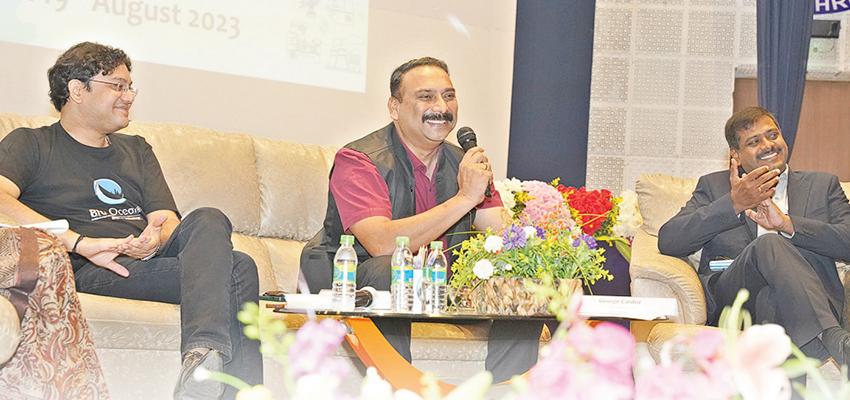
Thanks to the COVID-19 pandemic, technology in the corporate world has entered the work culture in an unprecedented manner, touching employees across sectors and departments. Thus is born the 5.0 Industrialisation where intelligent machines need the human touch to be successful. This great leap in industry is discussed threadbare by stalwart corporate leaders, in a recently held panel discussion at Sri Balaji University, Pune (SBUP) campus. The panellist are — Apar Gupta, tech wizard and founder, Blu Ocean Innovation; Thomas Augustine, Head HR, Bajaj Finance Ltd and George Cardoz, Head HR and Talent Acquisition, Talent Management and Development, Forbes Marshall. Corporate Citizen brings you the riveting discussion
CC: Could you enlighten us on 5.0?
Apar Gupta:I represent Blu Ocean which is a true deep tech start-up company and I am sure everybody on the planet today is well versed about the word 'start-up'. When I started this journey in 2016, this word ran through my mind. The start-up Indian ecosystem largely still revolves around online momos, chai, biryani and so on. But trust me, these are not the real ones. Start-up is something different and all you need to do is google for a few minutes to know that there is hardly any true startup in India.
Blu Ocean is a truly recognised deep tech startup globally. We have met the Prime Minister, five times. We are now also an official member of the International Scientific and Technological Education Program (ISTEP) which is the Principal Scientific Advisory team to the PM. It has been a roller coaster ride for us over the last two years. We never imagined where our hard work would lead us. We got a chance to get incubated in Microsoft US. We are being followed by celebrities like Robert Downey Jr. and the great Keanu Reeves. These are voices and I think some of those who have done their internship at Blu Ocean are aware. We frequently post on our social media and these celebrity investors share our posts further. This is a kind of a testament of what can happen when your passion turns into obsession.
To begin with, Blu Ocean is actually working on nanobots. It is Science that never existed before and when we started this journey, most of people used to perceive it as science fiction. Nanobot is a tiny robot that can be injected inside the human body and can travel through it. When we started this journey we were writing papers and publishing articles and it was very challenging to reach out to some potential investors. I still recall very clearly when people used to make fun of it. It was very hard to believe because most people have no inkling of what is Artificial Intelligence in the 5.0 Industry.
During my casual conversations with people, I ask them to start reading about companies like Neuralink, Elon Musk and Microsoft to understand AI. India is far behind in this technology. So I think, it's a new world we have stepped into, but we are at a nascent stage. However, there are opportunities. I have personally met some startups that are incubated at the ISRO campus. By the 2030s ISRO plans to go near to the sun. No other space organisation has ever dared to do so.
Thomas Augustine: There are a lot of good things that we have done at Bajaj Finance,as regards 4.0 and 5.0. I am an HR professional and deal more with people and their mindsets and less with machines. I still grapple with situations like an employee not getting parking space and which is impacting his productivity. If you look at a thumb rule, two per cent of the population would comprise people who create something in the world. You can call them management gurus or technology experts. For example, even if you go to a restaurant, they ask you to give feedback but only a few will oblige. I belong to the 98 per cent and many of us would be in this category.
The transition is challenging but the good part is that everyone would have a job never mind whether we are in the 4.0 or 5.0 stage. Today, you cannot survive without technology. Choose the right attitude and learn to adapt
— Thomas Augustine,
Head HR, Bajaj Finance Ltd.
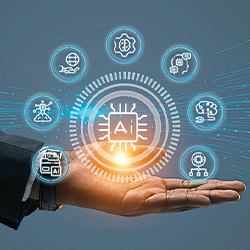
What is Industry 4.0? It's a concept that was created in Germany. A lot of research efforts were put, in terms of developing and implementing, technology practices. Industry 4.0 is all about automation. And suddenly one fine day, the European Council declares 5.0.—now 4.0 itself is not completely matured and has yet not been exploited to the advantage of the human being and to the society.
Suddenly, 5.0 steps in—what is 5.0? It's Artificial Intelligence, which is like a baby that needs to be nourished and taken care of by a parent called a human. Now this human has a lot of fear that if my AI baby grows and becomes a man, this man will cannibalise the parent. There is a fear, a sense of anxiety that needs to be removed. Automation is not God, it is not bigger than human beings. And, to remove that element of fear, one of the ways is to introspect as to what will happen if AI overpowers us. What will happen to me? What will happen to my existence? Nothing.
Elon Musk, the CEO of Tesla made a statement through a tweet I remember. He said that, yes, excessive automation in Tesla was a mistake. And he goes on to say, to be precise, "it was my mistake". And he ends it beautifully, "Humans are underrated".
George Cardoz:According to me, whatever I understand is 4.0. and I think the first point that I would like to make is bringing humans back into technology. Whatever I learn and understand, 5.0 brings in the human into the technology. And that's why it is coined as human tech, 5.0. Thanks to all the scholars who have brought back the human element, because he/ she was going away from the whole environment. Technology was probably taking place of the humans.
So, we have to look back at the journey since the Industrial Revolution. In 1780, steam engines were created. Then came electrification. That is 3.0. and that took about 200 years. So, automation came in 2010. From 3.0 to 4.0, it's been just 40 years and we are talking about 5.0 already. The pace of change is accelerating. So, we as human beings also have to catch up with the change or the acceleration of the change. And human beings have survived for so long with changes. So, if you have to survive, you have to be one up. And, as has been said, human potential is underrated. We all have infinite possibilities and potential.
Right from the stone age, we have used tools to survive. So, AI is also a tool and aid, the way I see it. The more we get used to them as aids, they enable us to perform better. That is where our existing is going to be. So, we have to learn to collaborate. If we see AI as a competitor, then we will kind of get into a war.
I remember a movie, 'Eagle Eye'. It is a science fiction where eventually the robot overtakes humans and starts killing them. Finally, the story ends wherein the humans are able to put an end to the robot. Now, that is what I am trying to bring in that we are superhuman beings. We can be the point speck of dust or we can call ourselves infinite. So, we have to start looking at where I see, which spectrum I plan to be.
I continue to be original by being passionate about what I am doing. This sense of being original is what I feel is lacking in most of the population. I still recall I used to talk to people and ask them that as to why they were graduating and hardly anyone came and said they were doing it because they were crazy about it
— Apar Gupta,
Founder, Blu Ocean Innovation
CC: In your own company how is 5.0 implemented and what is it all about?
Apar Gupta: Most of the team members know that I am a crazy follower of science fiction movies and way back when I started my journey as an intern at 18 years age, the 'Iron Man' movie was launched. I saw it in Hyderabad and I was fascinated with the voice commandant modules and so on. I found this technology amazing, so I asked my IT team to develop something like this. After doing research for several weeks, they found it challenging but I egged them on.
Meet Mr. Mason
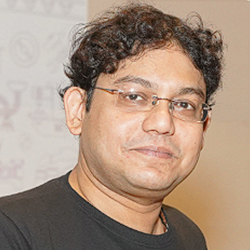
Consequently, in 2021 we made our own voice-commanding software which is called `Mason'. It does wonders like it creates job offer letters and for that, we just give the command “Hey Mason shoot out an offer letter to this candidate” and the Mason will just voice command “Apart from this, what you like me to do”. Finally, when the draf
of the offer letter is ready, immediately the software will send out the offer letter. Similarly, if you want to do CC email to stakeholders in the company it will be done. It will even issue certificates of internship and it can even draft a legal agreement for you. The Mason will use real-time Artificial Intelligence and then they will get the modules, to get the agreement done. We have developed our Blu Ocean Operating System and I think in India, we are the only company that has owned this.
Whenever I used to ask people who interned with us to develop an operating system—the reason that they gave was they lacked knowledge of coding languages like Java.
The young team
I want to stay out of the crowd and be original. I am in my mid-thirties now and it's been over a decade since I started my journey. I continue to be original by being passionate about what I am doing. This sense of being original is what I feel is lacking in most of the population. I still recall I used to talk to people and ask them that as to why they were graduating and hardly anyone came and said they were doing it because they were crazy about it.
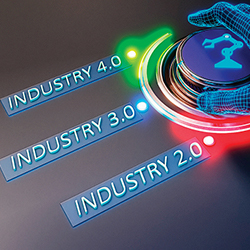
I will just share two examples from Blu Ocean. All members in Blu Ocean are freshers, we don’t hire experienced people. It is strictly for freshers. In 2018, I wanted a real-time animation person in the group and when I came to know that in this industry nobody actually knows animation and that’s why we are not able to make movies like Avengers and Marvels. Hence, we rolled out a position through recruitment platform, Naukri.com. We got some 650 CVs in a few days and I started talking to each and every candidate. I realised that 98 per cent of the people were not able to design the idea that I put in front of them. People found me crazy because I wanted a single person to design my idea despite employing a 20-person team.
However, amongst the 650 applications, I found a person. He agreed to work on this project and I asked him about the deadline. He said, “I have classes in the morning so I will try to submit it by the morning of the day after tomorrow or by tomorrow evening.” I found that person crazy because this task was not something so easy that it could be finished within a day. The task I gave to him was to make a two minutes video capsule of our company, resembling to an Avengers movie. He gave it to me the next day and I started crying. I shared it with my team members and my family. They were completely surprised and said, “Who made this? Have you hired an agency for it?”
Then I immediately looked back and when I saw the CV again, he was a 16-year old kid who was in 11th Std. So, I immediately called that guy the next morning—his name is Anup and he is heading my animation and has just completed his graduation now. I asked him “Anup how did you do this? Who are you?”. Then he shared his story that he has been a breadwinner of his family since he was 8 years old.
I see him as one of the biggest wonders in the coming decade. He plans and shapes the entire animation industry, he creates movies beyond the animation in Avengers. He started watching YouTube at the age of 9 and did not have that much money to afford classes. He said, “I just borrowed a second hand tab and learned animation for six years from YouTube.”
Consequently, I issued an offer letter to Anup and asked him to complete his academic work in the morning and work here in the evening. This is how he started coming to the office.
Similarly, our IT person who designed our AR module and now working on the Blu Ocean operating system, is a second-year engineering BTech failure. He does not have a degree but nobody can beat him in IT so far. I challenged him to make software and he said he would develop it in four days. So, the talent is there.
Thomas Augustine:Bajaj Finance is not a finance company; it is a non-banking financial company (NBFC). We have a simple business of lending and taking back the money, a business that is going on for years. But, this we do in a very professional manner and I must take pride in saying that we are one of the leading NBFC in the country.
So as I mentioned earlier, nothing is going to happen to our jobs in the coming years. That’s because when I joined in March 2016, we were around 6000 people and today the number has increased to 42,000 people. Seven years ago, there were hardly 75 IT people in our company. We were compelled to grow and this is where Industry 5.0 became important in our company. The transition though was a nightmare.
When the Covid pandemic struck we were unable to sell as there was social distancing and most of our work was physical. We were the first company to come back on the ground when the lockdown lifted up. But there was no customer response and hence we had to change our strategy. We needed to be omnipresent. Not only in physical form but also in digital form and hence that led to the creation of an App and a web portal.
Automation is not God, it is not bigger than human beings. And, to remove that element of fear, one of the ways is to introspect as to what will happen if AI overpowers us. What will happen to me? What will happen to my existence? Nothing
— Thomas Augustine
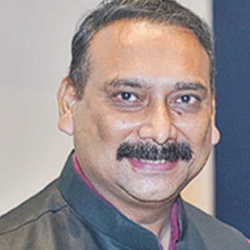
Our company is full of non-technological people but we were compelled to adapt to technology. That was a big challenge for an HR person like me. We needed to create that entire infrastructure and for that we had to find people who are technological experts. We did a lot of research and today we created three different segments of employees within the company-Service age, Information age and Conceptual age. We created these segments to differentiate policies, programmes, features and benefits, especially for information and conceptual age. Today, we are close to around 1,000 people in IT. That is what 5.0 did to our industry.
The transition is challenging but the good part is that everyone would have a job never mind whether we are in the 4.0 or 5.0 stage. Today, you cannot survive without technology. Choose the right attitude and learn to adapt.
George Cardoz:We are a steel engineering, control instrumentation and hard-core manufacturing company. Being in this profession we have people working on-site. We tried putting the policy of working from home but it never would take off. But due to Covid pandemic, we were able to break that barrier. I remember that on 22nd March, 2020, the lockdown was announced; our operations had to start from 14th April, 2020. Hence, we moved business to online but manufacturing had to happen on site. With the lockdown, we had a big challenge to get our people to work.
In my belief, Covid pushed most industries and companies to get into the 4.0 and 5.0 mode. Hence, for the first time in the history of Forbes Marshall, we started working online. We faced many challenges in giving on-the-job training to the employees through video conferencing, as many of the people did not have any idea how to operate such applications
Covid pandemic enabled us with ways to automate and work along with humans and machines to enhance productivity. This is how we embarked upon bringing a lot of automation into the organisation. We have at least eight robotic welding machines, realising that the automation 5.0 approach brings sustainability and business continuity. It reduces human dependency but it also brings a lot of safety. Now with the growing technology, some parts of the welding work are being replaced by robots. Further, the replaced people are now reskilled with non hard-core manufacturing and operational activities. People who were machine operators were reskilled to do supply chain operation activities.
Technology is moving so fast that you have to unlearn the old things and relearn new things according to moving time.
"The first rule of start-up is, go for something that never existed before. Second, probing a bigger problem of the society. Third, the founders should not have any technical knowledge in that area like these pizza delivery guys. Fourth is the scalability"
— Apar Gupta
CC: What should student managers look for to become successful in the corporate world? What did you particularly look out for?
Apar Gupta:When I was looking for a job after my MBA, the most important thing I was looking out for was a good branded company and its profile and the person to whom I would be reporting. Because, I know that I'm not good at handling organisational politics and my current journey is a result of that only. So I think, one should be very selective with the brand name of the company. The last thing, that I would suggest is, giving importance to the financial package, which I think is a blunder made by most people. So don't get into that trap.
Let's take the case studies of the very famous start-up ecosystems. I don't think any startup is offering a stable job. I got an opportunity in 2018 to be invited to a virtual platform in Silicon Valley by Y Combinator. They are the first organisation to contribute to the start-up ecosystem globally.
I came across this case study of Boom Technology, one of the first recognised startups globally. They did something very crazy and nasty.
There were three friends. They were pizza delivery guys. They were running their own shop in Chicago, USA. Probably one might be making the pizza and the rest two might be doing the delivery. One night, one of these three friends, shared with the other two that, you know, when I was a kid, I used to make paper planes. He said, “Guys, you won't believe that when I make these paper planes even now, they go very high, at a very high speed”. So the others took it lightly but he was persistent with this saying , “Guys, just see once how I make my paper planes". One day they said, “Okay, show us”.
So he made that paper plane and it was flying very high. They found something unique with this paper design. So through Y Combinator, they lined it up with NASA, within a few weeks. The demonstration was done in front of NASA and immediately the scientists and engineers figured out that, knowingly or unknowingly, he had broken the code that has been warning global scientists for the past 70 years. They broke the code through this aerodynamics and NASA could figure out that a conventional aircraft, which is coming from Chicago to Hong Kong in 20 hours, can reach in just six hours. Maybe New Delhi to New York is just five hours. A demonstration flight was made and an aircraft was designed. Somewhere in 2003-2004, the trial was done successfully.
So the first rule of start-up is to go for something that never existed before. Second, probing a bigger problem of the society. Third, the founders should not have any technical knowledge in that area like these pizza delivery guys. Fourth is the scalability. However, none of these four rules are obeyed by most of the Indian start-ups.
You should ask yourself - What do I have to do? Where do I have to go in life? What do I have to do in my career? Most people are not even having plans. When I crossed the age of 25, even today I am hardly able to take any kind of a proper nap and the same is with my entire team. I personally believe, there is no word like learning and developing. No one can make you learn, no one can make you do anything. There is one word, self-motivated and this is what I follow, personally.
Technology is moving so fast that you have to unlearn the old things and relearn new things according to moving time. Covid pandemic enabled us with ways to automate and work along with humans and machines to enhance productivity. This is how we embarked upon bringing a lot of automation into the organisation
— George Cardoz,
Head HR and Talent Acquisition,Forbes Marshall
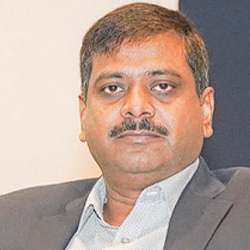
I am sure most of the people are not utilising the technology. WhatsApp is not meant for what we are exactly using it for. YouTube is not meant for exactly what most of the people are using it for. Let's make technology a boon, not a bane.
Thomas Augustine: Keep yourself updated at all times and choose a style. Try and make some small sacrifices that makes you cut you above the rest and that should give you a competitive advantage. Secondly, I would like you all to learn to love the data. We have to get on to data. So, data could be in terms of numbers, it could be non-numbers also. But learn to interpret data and analyse it in such a way that it will help in decision-making. Just be ready. Prepare yourself well. Even if you don't want to be a technologist, you have to be a part of the entire environment. Otherwise, you will be like an ostrich. At Bajaj Finance, we do not have patience. We are a very judgmental company and we make perceptions. Judgment has to become a way of life and you have to be always on your toes. But the fact is you have to go through this grind if you want to be a part of the corporate culture. Every day ask one question — Have I added value to what I am trying to do? Every day you need to get up and prove what value you are going to add. Whichever area you are working in, see how can you change the life of the other person or in the work that you are doing.
George Cardoz:The message from me is to remember 3 G's. First is to have a Goal in life, be clear about what you are and be clear about what you want to do. What is your purpose? Where do you want to go? We are all unique people. We have our own thoughts and we have our own dreams. So, have a goal in life that will kind of navigate you to the point that you are looking forward to.
The second G is Upgrade-upgrade yourself. If you look back yourself and ask what have I done differently, how have I upgraded myself, in whichever ways you feel—the parameters can be yours. Nobody else can tell you what is the parameter for yourself to evaluate. The last G is I would say be Grateful. Gratification I think is the best attitude to carry